Committee Report
Peru
Argentina
Chile
Mexico
Spain
Turkey
Israel
Greece
Australia
New Zealand
By Steven Kuchuck (USA) and Marianne Kennedy (Australia),
Co-chairs of the International Chapters Committee
We were thrilled to be able to meet with so many of the international chapter presidents and board members at the recent Sydney conference for a lunchtime meeting, and look forward to seeing many of them again in New York City next June. It was good to hear about the numerous and interesting chapter activities and, as always, we appreciate their chapter reports to the larger IARPP community.
The chapters’ work to disseminate relational teachings—often in the form of study groups, invited lecturers from within and outside of the country, and programs occurring both online and in-person—is at the heart of IARPP’s mission. Along with the IARPP Board, we fully support their ongoing efforts. We invite those IARPP members in countries that do not yet have chapters to contact us for more information about how to establish a chapter.
Also, we wish to congratulate and welcome our newest chapters: Peru and Argentina! Their reports follow below, and our understanding is that they plan to join us in New York City next year. Additionally, potential chapters in both Turkey and Sweden are in formation, with a report from Turkey included below.
In closing, as part of the new set of bylaws recently adopted by the IARPP Board of Directors, the Local Chapters Committee (LCC) is now known as the International Chapters Committee (ICC). We believe that this more accurately reflects the nature of our committee and its members.
Warm regards,
Steve Kuchuck and Marianne Kennedy
 Steven Kuchuck, LCSW, ICC Co-chair and IARPP Board Liaison
Steven Kuchuck, LCSW, ICC Co-chair and IARPP Board Liaison
222 West 14th Street, Suite 5M
New York, NY 10011 USA
Email Steven Kuchuck
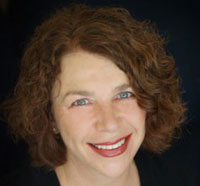 Marianne Kennedy, MA, ICC Co-chair
Marianne Kennedy, MA, ICC Co-chair
Level 1, 215 Darling St
Balmain, NSW 2041 Australia
Email Marianne Kennedy
 Back to Top
Back to Top
Opening of the IARPP Peruvian chapter: Thoughts and Activities
By Marie Saba, President
Finally, after years thinking about the idea, the Peruvian chapter of IARPP was established in May of 2017, becoming the third chapter in Latin America and the fourth one in a Spanish-speaking country. As you might imagine, we’re delighted and filled with enthusiasm. So far we’ve been busy with study groups, assisting with translations and publications of relational books, conferences, one book presentation, and the first IARPP-Perú seminar. And this is just the beginning. I would like to share with you a few words about where are we now and where are we headed. Through future projects and events in our chapter we are aiming to strengthen relational thought in Perú, joining together with the other Spanish-speaking IARPP chapters and with the rest of the international community, and building a space where creative, critical thinking can develop.
First, please allow me a brief aside to answer a question that comes to mind: why open the chapter now? Why not before, or after? Psychoanalysis has a long history in Perú. Back in 1915 Dr. Honorio Delgado was the first Peruvian psychoanalyst, a pioneer in South America. Besides being a prolific writer with important publications, he also wrote and received letters from Freud and was appointed by Abraham to be a psychoanalyst when Freud was still alive. Probably the most important and influential professional was Dr. Carlos Alberto Seguin who in 1941 opened the first psychotherapeutic school in a public hospital. There, he had many disciples who, in turned, developed psychoanalytic thought further. This was not a bad start for psychoanalysis, especially if we compare this with other societies where conservative tendencies slowed down new initiatives. These were pioneers who created a space with enormous possibilities.
There are also important contemporary Peruvian psychoanalytic contributors, such as the creative clinical and theoretical work of Dr. Max Hernandez. His book, Memoria del bien perdido. Conflicto identidad y nostalgia en el Inca Garcilaso de la Vega, analyzes the life and work of the memorable writer, Garciliaso de la Vega. In a more recent book, En los márgenes de nuestra memoria histórica (Lima, 2012, Fondo editorial USMP), Hernandez analyzes different Peruvian epochs, from the pre-Inca Chavin civilization to the present moment, emphasizing the relationship between sociohistoric circumstances and mental structures present in these contexts. There is no doubt that these are invaluable publications.
Notwithstanding Hernandez’s and other important contributions from Peruvian mental health professionals, the general impression is that in spite of an early and promising beginning, psychoanalytic clinical and theoretical development slowed considerably over many decades. Why did this happen? There could be many theories about this but I would like to briefly mention the social and political circumstances that might have contributed to this occurrence. Since pre-colonial times, Perú has had the presence of authoritarianism and hierarchical structures which certainly the Spanish conquest didn’t help to change. Last century, during the time when psychoanalysis gained interest among professionals as well the general public—the early 1970s—Perú experienced repression under a military dictatorship (between 1968 and 1975). Almost no freedom of speech, constant fear, and the pressure to obey certainly influenced critical thought and creative development in many disciplines, and mental health professionals were no exception; psychoanalytic creations are scarce without freedom. Time passed, the government changed, and democracy was installed, but relatively few years later terrorism by groups such as “Shining Path” began, which escalated to a civil war that lasted from about 1980 to 2000.
At the present time things have changed. We have had democratic governments for seventeen years now, with peace and freedom of expression the norm. I believe this has influenced many aspects of our social context, and psychoanalytic thought is no exception. During the seventies there was only one psychoanalytic institute that was relatively well-known. Recently the situation has changed dramatically. There are now several psychoanalytic schools and organizations representing a great variety of perspectives. For example, the APPA (Peruvian Association of Analytic Psychology) was also formed this year, a syncronicity that we certainly celebrate.
So, going back to the beginning of this text. What activities are we planning to program in the Peruvian chapter of IARPP?
A deep understanding of texts enables a critical approach toward them. For this reason, over a year ago we formed an interdisciplinary group that has been gathering once a week to read and discuss a variety of texts. Comparing concepts and theories, going back and forth in time, and reading and analyzing different authors, have created conflicts, sometimes small (other times not so small), along with some lively debate and dialogue. Seldom have we all been in total agreement; being a diverse group, with members from different disciplines, backgrounds, religions, and psychoanalytic schools, conflict is expected. Nevertheless, it is in this encounter of perspectives that we have been able to think about our own practice and the importance of relational thought in—and out—of the consulting room. It has been an enormously enriching experience. As mentioned above, there are now several psychoanalytic organizations in the country; however, IARPP Perú is, in my opinion, one of the few—if not the only—institution offering a space where encounters with different perspectives is welcomed and encouraged.
IARPP-Perú emphasizes the importance of spreading relational thought in our country, with an emphasis on the academic world. This is why IARPP-Perú and the Master Program in Psychoanalytical Clinical Intervention at the Pontifical Catholic University of Perú (PUCP) have agreed to a program of collaboration that we believe will help us in the efforts toward our goals.
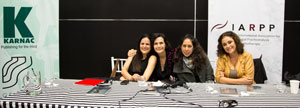 In May we had our first event based on this collaboration. The Spanish translation of The Enigma of Desire, by Galit Atlas, was published by Karnac in collaboration with Gradiva, a Peruvian editorial house that specializes in mental health books. IARPP-Perú and PUCP organized a book presentation held at the Museum of Contemporary Arts of Lima, a wonderful atmosphere where people had the opportunity to hear about relational psychoanalysis and meet the author. A seminar entitled “El enigma del deseo: Una perspectiva desde el psicoanálisis relacional” (“The Enigma of Desire: A Relational Psychoanalytic Approach”) was also organized, which was led by Galit Atlas and Lewis Aron. We are forever grateful to Galit and Lewis for this seminar; their commitment, enthusiasm, and generosity made this first event unique.
In May we had our first event based on this collaboration. The Spanish translation of The Enigma of Desire, by Galit Atlas, was published by Karnac in collaboration with Gradiva, a Peruvian editorial house that specializes in mental health books. IARPP-Perú and PUCP organized a book presentation held at the Museum of Contemporary Arts of Lima, a wonderful atmosphere where people had the opportunity to hear about relational psychoanalysis and meet the author. A seminar entitled “El enigma del deseo: Una perspectiva desde el psicoanálisis relacional” (“The Enigma of Desire: A Relational Psychoanalytic Approach”) was also organized, which was led by Galit Atlas and Lewis Aron. We are forever grateful to Galit and Lewis for this seminar; their commitment, enthusiasm, and generosity made this first event unique.
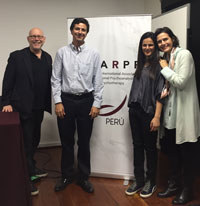 The Peruvian press has shown great interest in these events as well as in relational thought in general. News releases, interviews, and articles have been published in the major newspapers in Perú. For instance, El Comercio published two interviews, one with Atlas and the other with Aron, in which they explained the major concepts in relational psychoanalysis as well as its current relevance. Furthermore, the e-news portal, La Mula, posted an article in which the themes of The Enigma of Desire and relational psychoanalysis were discussed. This publicity has been a valuable support in achieving the goals of IARPP-Perú. Here is a link to Atlas’ interview in El Comercio: http://elcomercio.pe/eldominical/entrevista/galit-atlas-sentimiento-enigmatico-424813 And here is a link to Aron’s interview as well: http://www.lampadia.com/opiniones/lewis-aron/el-psicoanalisis-fue-desarrollado-por-refugiados/.
The Peruvian press has shown great interest in these events as well as in relational thought in general. News releases, interviews, and articles have been published in the major newspapers in Perú. For instance, El Comercio published two interviews, one with Atlas and the other with Aron, in which they explained the major concepts in relational psychoanalysis as well as its current relevance. Furthermore, the e-news portal, La Mula, posted an article in which the themes of The Enigma of Desire and relational psychoanalysis were discussed. This publicity has been a valuable support in achieving the goals of IARPP-Perú. Here is a link to Atlas’ interview in El Comercio: http://elcomercio.pe/eldominical/entrevista/galit-atlas-sentimiento-enigmatico-424813 And here is a link to Aron’s interview as well: http://www.lampadia.com/opiniones/lewis-aron/el-psicoanalisis-fue-desarrollado-por-refugiados/. 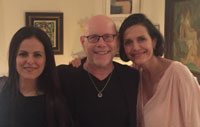
The Peruvian chapter is working on a number of other new projects. More books are being translated and edited. Among them is the Spanish translation of Being Present for Your Nursery Age Child, by Jeanne Magagna, which has been published by Karnac in collaboration with Editorial Gradiva. Magagna’s approach shares various key points with relational theory, which is why our chapter organized her visit to Lima, including talks at Católica University, CPAL (the Peruvian Center for Audition, Language, and Learning), and the Peruvian Psychoanalytic Society, as well as conferences for teachers and parents at two schools.
Another book that is close to being published is the Spanish translation of Traumatic Narcissism: Relational Systems of Subjugation, by Daniel Shaw. IARPP-Perú is planning a symposium about power dynamics from a relational psychoanalytic perspective. We are currently organizing the details for a conference featuring Daniel Shaw next year which will, needless to say, generate discussion of a topic that is critically important in today’s society.
Among our long term goals, we wish to achieve greater collaboration with the other Spanish-speaking chapters of IARPP, in order to enhance the diffusion of relational ideas in Latin America and Spain. Considering the number of clinicians who have Spanish as their mother tongue, to have more articles and books published in this language would promote greater discussion of these topics in the region as well. With time and dedication we anticipate achieving these and other goals, and the Peruvian chapter, with the guidance of IARPP, is committed to working together toward these goals.
With these activities we hope to develop ways of recognizing and relating to each other as a community, facilitating encounters with one another based on the commitment to respect and the responsibility to understand each other, which characterizes relationality.
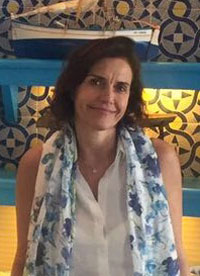
Marie Saba, MA
Lima, Perú
Email Marie Saba
![]()
Back to Top
2017 Activities of the New Argentina Chapter of IARPP
By Mariela Cuello, Secretary, and Alberto Samperisi, President
(clic aquí para el español)
We’ve been working on the process of establishing the Argentina international chapter of IARPP, having finalized and approved our bylaws in July. Upon approval from the IARPP Board, we have become a new international chapter.
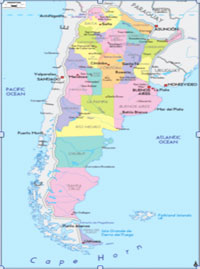 Alberto Samperisi represented us at the IARPP conference in Sydney, Australia, in May of this year, giving a paper as part at the panel entitled “Psychoanalysis and Psychotherapy in new areas of IARPP.” Samperisi shared the story of the development of relational psychoanalysis in Argentina. A small group of psychoanalysts in the region of Cuyo – far from Buenos Aires and far from the center of the psychoanalytic world—found concepts from classical analysis such as the projective screen and the rule of abstinence to be problematic. Recognizing the need to explore new perspectives and ways of practicing psychoanalysis, Samperisi described how this group came to find in relational psychoanalysis a much more suitable framework for their work. It’s the aim of our chapter to act as a platform for IARPP in order to expand relational thought from Cuyo throughout all of Argentina.
Alberto Samperisi represented us at the IARPP conference in Sydney, Australia, in May of this year, giving a paper as part at the panel entitled “Psychoanalysis and Psychotherapy in new areas of IARPP.” Samperisi shared the story of the development of relational psychoanalysis in Argentina. A small group of psychoanalysts in the region of Cuyo – far from Buenos Aires and far from the center of the psychoanalytic world—found concepts from classical analysis such as the projective screen and the rule of abstinence to be problematic. Recognizing the need to explore new perspectives and ways of practicing psychoanalysis, Samperisi described how this group came to find in relational psychoanalysis a much more suitable framework for their work. It’s the aim of our chapter to act as a platform for IARPP in order to expand relational thought from Cuyo throughout all of Argentina.
In August, the Puntana Association for Psychoanalytic Psychotherapy (APPSI) in San Luis, Argentina, launched our program entitled “Training in Relational Psychoanalytic Psychotherapy Seminars.” The Puntana Association has been a space for thinking about and training in psychoanalysis since the 1970s. This training is theoretically based on the book written by Stephen Mitchell and Margaret Black, Freud and Beyond: A History of Psychoanalytic Thought (1996), as well as other texts. It’s also based on the clinical implications of the three anchors of psychoanalytic training (the personal analysis, supervised training cases, and academic coursework).
The goal of these seminars is to create space for thinking about and performing psychoanalysis in the context of the intersubjective field, recognizing the singular importance of the relational matrix in which we take part as analysts in our various clinical activities. Keeping always in mind the social, cultural, and historical contexts that inexorably impact the analytic dyad, this training program explores the various psychoanalytic paradigms from Freud to the present, identifying how each paradigm has contributed to the creation of relational psychoanalysis.
To theorize and to practice from a relational psychoanalytic point of view calls for a reflective capacity that, far from occurring in isolated minds, instead brings us together and makes us think about ourselves in relation to others and with others. In these seminars we will consider the “social mind” as written about by Bion, Meltzer, Mitchell, among many others.
Argentina Local Chapter Board:
Alberto Samperisi, MD–President
Psychiatry Specialist, Psychoanalyst
Email Alberto Samperisi
Mariela Andrea Cuello, BA–Secretary
Psychoanalytic Psychologist
Email Mariela Andrea Cuello
Graciela de Rosas, BA—Academic Secretary
Psychologist, Psychoanalytic Psychotherapist
Email Graciela de Rosa
Graciela Bazán, MD–Treasurer
Medical Psychiatrist, Magister in Psychoanalytic Psychotherapy
Email Graciela Bazán
Daniel Díaz, BA—Member, Auditing Committee
Psychoanalytic Psychologist, Higher Education Professor
Email Daniel Díaz or here
María Paula Salomone Álvarez, BA—Member, Auditing Committee
Psychoanalytic Psychologist
Email María Paula Salomone Álvarez
Teresa Isabel Correa, BA—Entitled Member
Psychoanalytic Psychologist, Higher Education Professor
Email Teresa Isabel Correa
María Josefina Shortrede, BA—Entitled Member
Psychoanalytic Psychologist
Email María Josefina Shortrede
Mariela Emilce Sánchez, BA—Substitute Member
Psychoanalytic Psychologist, Higher Education Professor
Email Mariela Emilce Sánchez
Jessica Picco Lieto, BA—Substitute Member
Psychoanalytic Psychologist
Email Jessica Picco Lieto
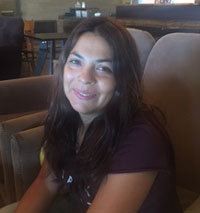 Mariela Andrea Cuello, BA
Mariela Andrea Cuello, BA
Barrio Portal de la Aguada
Manzana B Casa 9
5700 San Luis, Argentina
Email Mariela Andrea Cuello
 Alberto Samperisi, MD
Alberto Samperisi, MD
1339, San Martin Street
5700 San Luis, Argentina
Email: asamperisi@hotmail.com
Actividades 2017- Capítulo Argentino de la IARPP en formación.
By Mariela Cuello, Secretary, and Alberto Samperisi, President
(click here for English)
Hemos estado trabajando en el proceso legal en la formación del Capítulo Argentino de IARPP de acuerdo a las leyes argentinas, el cual finalmente fue aprobado en julio. Y esperando la aprobación del Comité Directivo de IARPP para pasar a ser un Nuevo Capítulo de IARPP.
El Doctor Alberto Samperisi presentó su trabajo como panelista representándonos en el Congreso de IARPP en Sydney, Australia, en mayo de este año.
En su trabajo llamado “Panel sobre Psicoanálisis y Psicoterapia en nuevas áreas de la IARPP”, explica la historia de cómo el desarrollo del psicoanálisis en una pequeña comunidad de Argentina, lejos del centro, es decir de Buenos Aires, encontró sus vicisitudes y sus problemas en el uso de la pantalla proyectiva en blanco o la regla de abstinencia, por ejemplo, surgiendo la necesidad de explorar nuevas perspectivas y modos de practicar psicoanálisis hasta que encontramos en el Psicoanálisis Relacional un marco de referencia adecuado.
En agosto hemos dado comienzo a los “Seminarios de Formación en Psicoterapia Psicoanalítica Relacional, llevados a cabo por la Asociación Puntana de Psicoterapia Psicoanalítica (APPSI) en San Luis, Argentina.
Esta Formación se basa teóricamente en el libro escrito por Stephen Mitchell y Margaret Black ”Más allá de Freud”: Una historia del pensamiento psicoanalítico moderno (1996), entre otros autores. Además se basa en la clínica referenciada y en los tres pilares de formación psicoanalítica (psicoanálisis, supervisión y formación) que permite la generación de espacios de pensamiento respecto a nuestros modos de pensar y de hacer psicoanálisis en el campo intersubjetivo y en las singularidades de las matrices relacionales de las que, como terapeutas, nos volvemos parte en las distintas experiencias de relación terapéutica. Teniendo siempre en cuenta el contexto social, cultural e histórico del cual emergen, que atraviesan a analista y paciente inexorablemente.
Se investiga la formulación de distintos paradigmas psicoanalíticos que fueron emergiendo, partiendo de Freud hasta la actualidad. Reconociendo los aportes que cada paradigma brindó a la creación de un Psicoanálisis Relacional. En medio de otros distintos paradigmas psicoanalíticos.
Cómo pensar, cómo distinguir, cómo analizar clínica y humanamente las diferentes situaciones presentes en nuestra experiencia como analistas relacionales, comprende una actividad de reflexión que, lejos de ser aislada y solitaria, nos convoca a agruparnos y a pensar/nos en relación “a otros” y “con otros”. Partiendo de la premisa de que “la mente es social”, al decir de muchos autores como Bion, Meltzer, Mitchell entre otros.
 Mariela Andrea Cuello, BA
Mariela Andrea Cuello, BA
Barrio Portal de la Aguada
Manzana B Casa 9
5700 San Luis, Argentina
Email Mariela Andrea Cuello
 Alberto Samperisi, MD
Alberto Samperisi, MD
1339, San Martin Street 5700
San Luis, Argentina
Email Alberto Samperisi
 Back to Top
Back to Top
News from IARPP-Chile
By María Eugenia Boetsch (President), Víctor Doñas, and André Sassenfeld
Dear IARPP Community,
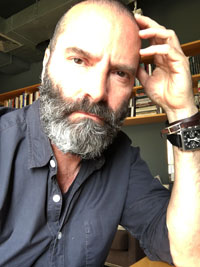 In appreciation for his time with us, we would like to share with all of you details of Eyal Rozmarin’s recent visit to Santiago. Over the course of three days of activities, we had the opportunity to listen and reflect on his work. First, in a collaborative experience with two other Chilean psychoanalytic institutions, he presented his paper “A Second Confusion of Tongues: Ferenczi, Laplanche, and Social Life.” Two analysts from our collaborating institutions commented on the paper and there was an interesting discussion that followed. On the next day, in an activity exclusively for IARPP-Chile members, Eyal shared his paper “Fathers Don’t Cry,” along with Carla Fisher, a Chilean psychoanalytic colleague who served as the discussant.
In appreciation for his time with us, we would like to share with all of you details of Eyal Rozmarin’s recent visit to Santiago. Over the course of three days of activities, we had the opportunity to listen and reflect on his work. First, in a collaborative experience with two other Chilean psychoanalytic institutions, he presented his paper “A Second Confusion of Tongues: Ferenczi, Laplanche, and Social Life.” Two analysts from our collaborating institutions commented on the paper and there was an interesting discussion that followed. On the next day, in an activity exclusively for IARPP-Chile members, Eyal shared his paper “Fathers Don’t Cry,” along with Carla Fisher, a Chilean psychoanalytic colleague who served as the discussant.
 On the third day of Eyal’s visit, we met with ILAS, one of the main institutions that has worked in Chile with victims of political violence, reflecting on a moving and complex clinical case presented by a Chilean analyst and member of IARPP, Margarita Díaz. During this program we had the chance to share some current ideas that are relevant to IARPP-Chile. We expressed the need to open a space for relational psychoanalytic thinking in the fields of the social and the collective. We also had the opportunity to explore ways of relating with other psychoanalytic institutions, suggesting more collaborative events and other ways of sharing experience and knowledge through innovative technologies.
On the third day of Eyal’s visit, we met with ILAS, one of the main institutions that has worked in Chile with victims of political violence, reflecting on a moving and complex clinical case presented by a Chilean analyst and member of IARPP, Margarita Díaz. During this program we had the chance to share some current ideas that are relevant to IARPP-Chile. We expressed the need to open a space for relational psychoanalytic thinking in the fields of the social and the collective. We also had the opportunity to explore ways of relating with other psychoanalytic institutions, suggesting more collaborative events and other ways of sharing experience and knowledge through innovative technologies.
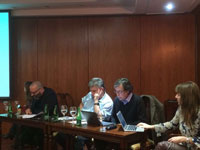 During Eyal’s visit we were able to record the first two presentations while also live streaming them via our Facebook page to IARPP members in Buenos Aires. In what was considered an ethical and political gesture, Eyal read and discussed his papers in Spanish. This was enormously appreciated by our largely non English-speaking members.
During Eyal’s visit we were able to record the first two presentations while also live streaming them via our Facebook page to IARPP members in Buenos Aires. In what was considered an ethical and political gesture, Eyal read and discussed his papers in Spanish. This was enormously appreciated by our largely non English-speaking members.
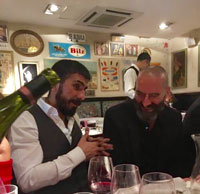 We are very thankful to Eyal for taking part in these successful programs. We would also like to express to the IARPP community around the world our desire for the Chilean chapter to continue this bond with the international community as we work together to expand the limits of our imagination.
We are very thankful to Eyal for taking part in these successful programs. We would also like to express to the IARPP community around the world our desire for the Chilean chapter to continue this bond with the international community as we work together to expand the limits of our imagination.
Additionally, IARPP-Chile recently organized a successful double book launch. The first book, Early bonds: Transformations at the Beginning of Life, is a collections of papers that was co-edited by local member Javiera Navarro. It explores various aspects of clinical work with very young children and their caregivers. During this event we also celebrated publication of the Spanish translation of Daniel Stern’s The Present Moment in Psychotherapy and Everyday Life, originally published in 2004. The translation was done by Chilean editor Francisco Huneeus and André Sassenfeld. Their collaboration previously produced translations of two books by Donna Orange. We are pleased to announce these efforts to expand relational thinking in the Spanish-speaking relational community!
Warmly,
The Board of IARPP-Chile
www.iarppchile.cl
iarppchile.blogspot.com
https://www.facebook.com/psicoterapiarelacional.ch
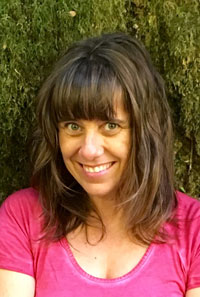 María Eugenia Boetsch S.
María Eugenia Boetsch S.
President, IARPP-Chile
Email María Eugenia Boetsch
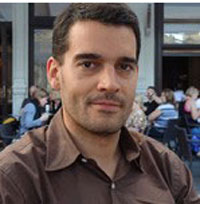 André Sassenfeld, MA
André Sassenfeld, MA
Email André Sassenfeld
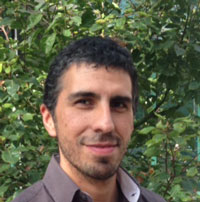 Víctor Doñas, MD
Víctor Doñas, MD
Psychiatrist, Psychoanalyst
Hernando de Aguirre 194 of 54
Santiago, Chile
Email Víctor Doñas

Back to Top
IARPP-Mexico Chapter Report
By Alejandra Plaza, Anne Marie Maxwell, and Patricia Minjares
(clic aquí para el espanol)
We are pleased to report on the recent activities of the Mexican chapter of IARPP.
First, we organized a workshop in May of 2017 entitled, “The Resurrection of Agency From the Ashes of War: A Son as Therapist to his Father,” taught by Jonathan Slavin and Miki Rahmani. Generously, the speakers devoted part of their vacation time to the workshop. Fifty therapists attended and reflected on the clinical practice of relational psychoanalysis in relation to agency and the generational transmission of trauma, listening to recordings of the therapeutic sessions that the patient allowed us to use.
Another workshop we organized in June 2017 was “To Be is to Betray: On the Place of Collective History and Freedom in Psychoanalysis.” The speaker was Eyal Rozmarin, to whom we are also very grateful and with whom the public spoke about freedom and its relation to social commitments that are internalized. It was transmitted via Skype to two other groups of therapists located in the provincial cities of Merida and Puerto Vallarta.
Finally, the IARPP-Mexico Board participated in a training program in relational psychoanalysis coordinated by Alejandro Ávila Espada with the Institute of Relational Psychoanalysis of Madrid, led by Carlos Rodríguez Sutil. This took place from February to July of 2017.
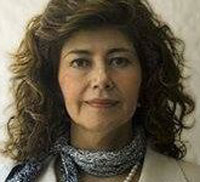 Alejandra Plaza Espinosa, PhD
Alejandra Plaza Espinosa, PhD
Uxmal 278. Narvarte 03020
Benito Juárez México D.F.
Email: Alejandra Plaza Espinosa
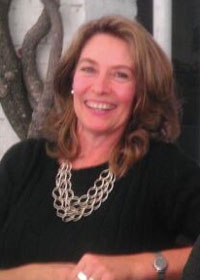 Anne Marie Maxwell Martínez, PhD
Anne Marie Maxwell Martínez, PhD
Morelos 3, Col. Pueblo de Axotla,
Delegación Alvaro Obregón,
Ciudad de México, DF, 04330, México
Email: Anne Marie Maxewll Martínez
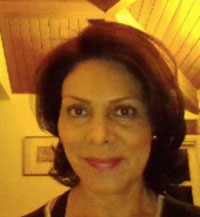
Patricia Ma Carmen Minjares, PhD
Cerrada de San Jerónimo # 72
Col. San Jerónimo Lídice México C.P. 10200
Email Patricia Ma Carmen Minjares
![]()
Reporte del Capitulo Mexicano IARPP
Por Alejandra Plaza, Anne Marie Maxwell, y Patricia Minjarez
(click here for English)
Tenemos el gusto de reportar lo siguiente:
Organizamos el taller: “La resurrección de la Agencia de las cenizas de la guerra. Un hijo como terapeuta de su padre” en Mayo 2017. Impartido por Jonathan Slavin and Miki Rahmani , quienes generosamente dedicaron parte de sus vacaciones para impartir el taller. Fue un curso muy interesante con la asistencia de cincuenta terapeutas que reflexionaron sobre la práctica del Psicoanálisis Relacional, tomando en cuenta la capacidad de Agencia y la trasmisión generacional del trauma. Esto se llevó a cabo a partir de las sesiones terapéuticas grabadas con la autorización del paciente.
Otro taller que se organizó fue : “Ser es traicionar. Sobre el lugar de la historia colectiva y de la libertad en el Psicoanálisis”. El ponente fue Eyal Rozmarin con quien estamos muy agradecidos . El Dr. Rozmarin dialogó con el público acerca de la libertad en el Psicoanálisis y los compromisos sociales que han sido internalizados. Se transmitió vía Skype a otros dos grupos de terapeutas en los estados de Mérida y Puerto Vallarta.
La Mesa directiva participó en un proceso de Formación en Psicoanálisis Relacional con el Instituto de Psicoanálisis Relacional de Madrid coordinado por Alejandro Ávila Espada y que dirige Carlos Rodríguez Sutil. De Febrero a Julio de 2017.
 Alejandra Plaza Espinosa, PhD
Alejandra Plaza Espinosa, PhD
Uxmal 278. Narvarte 03020
Benito Juárez México D.F.
Email Alejandra Plaza Espinosa
 Anne Marie Maxwell Martínez, PhD
Anne Marie Maxwell Martínez, PhD
Morelos 3, Col. Pueblo de Axotla,
Delegación Alvaro Obregón,
Ciudad de México, DF, 04330, México
Email Anne Marie Maxwell Martínez

Patricia Ma Carmen Minjares, PhD
Cerrada de San Jerónimo # 72
Col. San Jerónimo Lídice México C.P. 10200
Email Patricia Ma Carmen Minjares
![]()
Back to Top
News from IARPP-Spain
By Rosa Velasco, President, and Aleksandra Misiolek, Secretary
(clic aquí para el español)
IARPP Spain will be co-organizing together with IPR (Institute of Relational Psychotherapy, Madrid) the 5th Relational Psychoanalytic Meeting entitled, “The Couple and the Community: Transforming our Everyday Relationships” with Andrew Samuels (UK) and Phil Ringstrom (USA) as the invited speakers. The conference will take place in La Granja de San Ildefonso (Segovia), Spain, on February 23 and 24, 2018. The next IARPP Spain meeting will take place in Seville in October of 2019. We are currently working on choosing the main theme and deciding on the invited speakers and we will keep you informed in future issues of the eNews.
We would also like to express our profound sorrow about the terrorist attacks in Cataluña (Barcelona and Cambrils). We appreciate your solidarity and care. We have received words of affection from our colleagues all over Spain and all over the world.
La Rambla de Barcelona, the heart of Barcelona, a place where 14 persons lost their lives and hundreds were injured, is a street of the world. There are already 35 nationalities represented among the victims. Our organization is distinctive for its gathering colleagues from all over the world.
From the IARPP-Spain Committee, we are sending you this beautiful poem by Federico Garcia Lorca about La Rambla de Barcelona to accompany us in these moments and wishing that our bonds will protect the entire world.
“The happiest street in the world,
a street where the four seasons live at once,
the only street of the world that I wish would never end,
rich in sounds, abundant in breezes,
lovely in encounters,
old in blood: Rambla de Barcelona.”
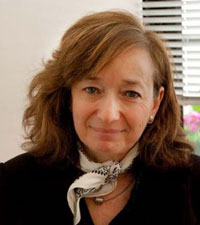 Rosa Velasco
Rosa Velasco
IARPP-Spain President
Email Rosa Velasco
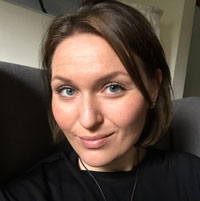 Aleksandra Misiolek
Aleksandra Misiolek
IARPP-Spain Secretary
Email Aleksandra Misiolek
![]()
Noticias de IARPP-España
Por Rosa Velasco, Predendeta, y Aleksandra Misiolek, Secretaria
(click here for English)
IARPP-E co-organiza con IPR (Instituto de Psicoterapia Relacional, Madrid) las V Jornadas de PSICOANALISIS RELACIONAL tituladas “PAREJA y COMUNIDAD: Transformando nuestras relaciones cotidianas” con Andrew Samuels y Phil Ringstrom como invitados especiales. El evento tendrá lugar en La Granja de San Ildefonso (Segovia) 23 y 24 de Febrero de 2018.
La próxima reunión de IARPP España tendrá lugar en Sevilla en 2019. Estamos trabajando en escoger el tema de la conferencia y decidir los principales invitados. Os iremos informando en los próximos Newsletters.
Queremos también compartir con todos vosotros nuestro profundo pesar por los atentados en Cataluña (Barcelona y Cambrils). Agradeceros vuestras muestras de solidaridad y cariño y comunicaros que nos ha llegado el afecto de nuestros colegas de toda España y de todo el mundo.
La Rambla de Barcelona, el corazón de Barcelona es el lugar en el que perdieron la vida 14 personas con un centenar de heridos en este momento, es una calle del mundo. Son ya 35 nacionalidades las encontradas entre las víctimas. Nuestra organización se distingue por agrupar a colegas de todo el mundo.
Desde la Junta de IARPP-E os enviamos este bonito poema de Federico García Lorca sobre La Rambla de Barcelona con la intención de que nos haga compañía en estos momentos y con el deseo de que nuestros vínculos nos protejan en todo el mundo.
“La calle más alegre del mundo,
la calle donde viven juntas a la vez las cuatro estaciones del año,
la única calle de la tierra que yo desearía que no se acabara nunca,
rica en sonidos, abundante de brisas,
hermosa en encuentros,
antigua de sangre: Rambla de Barcelona”
 Rosa Velasco
Rosa Velasco
Presidenta de IARPP-España
Email: Rosa Velasco
 Aleksandra Misiolek
Aleksandra Misiolek
Secretaria de IARPP-España
Email: Aleksandra Misiolek

Back to Top
News from Turkey
By Berrak Karahoda and Mia Medina
We are very happy to share news of our efforts that will hopefully lead us to establish a formal IARPP local chapter in Turkey in the near future.
Two leading psychodynamically oriented clinical psychology graduate (masters and doctorate level) programs at Boğaziçi University and Istanbul Bilgi University have been introducing relational thinking to the clinical and psychotherapeutic community in Istanbul for more than a decade. These programs have a relational orientation, and several of their faculty members have been IARPP members for a number of years.
As part of an aim to expand the relationally informed community even further, we intend to orient our efforts toward the establishment of a formal IARPP local chapter in the near future. Recently we developed two training programs open to psychodynamically informed psychotherapists and graduate students. These will be held from October 2017 to January 2018 and from February 2018 to June 2018. The first training will be a brief introduction to the theory and application of psychodynamic psychotherapies in general, including the contributions of relational psychoanalysis. A more advanced level second program will focus on contemporary thought in psychoanalysis and psychodynamic psychotherapy, and especially on the contributions of relational psychoanalytic thinking. Both programs will involve discussion of various important papers from the relational psychoanalytic literature.
Several important books of relational psychoanalytic thought have been translated and published by Istanbul Bilgi University Press over the years ,such as Stephen A. Mitchell and Margaret J. Black’s Freud and Beyond (trans. 2012), Stephen A. Mitchell’s Relational Concepts in Psychoanalysis (trans. 2009), and Can Love Last? (trans. 2010). The Turkish translation of Lewis Aron and Karen Starr’s A Psychotherapy for the People will be published in September 2017, and Jody M. Davies and Mary G. Frawley’s Treating the Adult Survivor of Childhood Sexual Abuse: A Psychoanalytic Perspective will also be hopefully published in 2018 by Istanbul Bilgi University Press.
The first of a compendium consisting of the Turkish translation of major papers published in the relational psychoanalytic literature will hopefully be published by June 2018 by Aletheia Books.
We hope that we will be sharing further developments, and that, within the current socio-political climate in Turkey, our efforts will continue unhindered.
Best regards,
Berrak Karahoda and Mia Medina
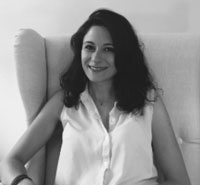 Berrak Karahoda, MA
Berrak Karahoda, MA
Istanbul, Turkey
Email Berrak Karahoda

Mia Medina, PsyD
Istanbul, Turkey
Website: www.psychodynamicpsychotherapies.com
Email Mia Medina

Back to Top
News from IARPP-Israel
By Offer Maurer, Chair
Dear relational friends,
These past months have been exciting and full of activity at the Israeli Relational Forum.
In February we organized a fascinating clinical evening on therapy endings with Jill Salberg, moderated by Adit Nir. This was followed in March by a special evening with Jonathan Slavin, Yeheskel Cohen, and Miki Rahmani, who also moderated, entitled “Those 45 minutes completely changed my life!” In this program the presenters looked deeply into Freud’s single session with a young woman, “ML.” Then, in April, we hosted a clinical program with Udi Chen who presented an interesting paper counter-balancing Winnicott and Ghent using fascinating clinical material. The discussant for that program was Roni Baht.
In May we ventured on with our second Hebrew-speaking local online colloquium, this time hosting Irene Melnick, who shared her beautiful and thought-provoking paper entitled “The Hungry Therapist: Narcissistic Deprivation Experienced by Therapists.” The colloquium was a big success, as reflected by the lively discussion within our Hebrew-speaking community.
In the coming few months we plan to host a clinical evening featuring presenter Riki Pelach-Galil and discussant Amit Fachler, dedicated to the topic of relational implications of father-son relationships in adolescence. Next will be a special presentation by Iris Lerman on the delicate connection between declarative and implicit knowledge and the intertwining of relationship and interpretation in therapy. Boaz Shalgi will be the disscusant. Another program will revolve around Dr. Ilana Laor’s intetesting dissertation, in which she takes a close look at the personal and professional development of therapists.
Finally we plan to extend our activity to Israel’s peripheral regions, launching two new study groups in the country’s north and south and also a large-scale conference in Akers. Our local board members Esther Rappoport and Udi Chen are the chairs for this conference.
All the best to our international community,
Offer Maurer, Chair, and the Israeli Relational Forum
Board: Dan Friedlander, Esther Rappoport, Judith Asher, Noga Guggenheim, Orna Schur, Shaily Wardimon, Tami Dror-Schieber, and Udi Chen
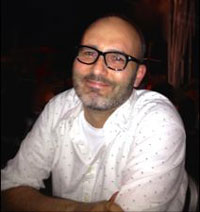 Offer Maurer, PhD
Offer Maurer, PhD
Clinical Psychologist
Chairperson, The Israeli Forum for Relational Psychoanalysis and Psychotherapy
Email Offer Maurer

Back to Top
News from IARPP-Greece
By Alexis Mordoh, Chair
In terms of news from our chapter, this year we started a peer supervision and consultation group for people interested in a relational psychoanalytic approach. This group has evolved and is now also serving as a study group, with participants selecting and reading papers from the relational literature on issues raised by the clinical cases that are presented. We have attracted more participants and have built a sense of openness, camaraderie, and initiative.
We are interested in having more people join us. The group is open to all clinicians with a graduate degree in the field of mental health who are interested in the relational perspective. In order to participate, you need to be a member in good standing of IARPP (please go to http://iarpp.net/membership-benefits/ for information) and a member of the Greek chapter, the latter being free of charge. For additional information, please contact me (alexismordoh@gmail.com, tel. +30-210-8084659) or Vassiliki Galani (galani22@yahoo.com, tel. +30 210-7256662).
In other news, we are planning a weekly Skype seminar entitled, “An Introduction to Relational Psychoanalytic Psychotherapy,” starting in January 2018. More details to follow.
We would like to invite relational teachers and supervisors who might be making arrangements to teach in Italy, Israel, or other neighboring countries, to contact us in order to discuss the possibility of also doing some teaching/supervising during a stopover in Greece. We also would like to invite the Israeli chapter and the relational institute in Rome, in particular, to work with us in order to organize some events jointly in our respective countries. We offer warm hospitality in a country that is a prime destination for travelers and has stunning scenery and a wonderful climate.
Alexis Mordoh, PsyD
Chair, IARPP-Greece
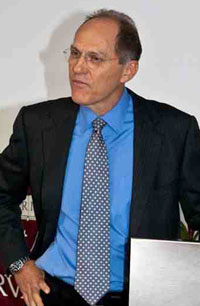 Alexis Mordoh, PsyD
Alexis Mordoh, PsyD
Clinical Psychologist
42 Patriarhou Ioakim Street, Athens, 106.75
65A Sarantaporou Street, Kifisia, 145.63 Greece
Email Alexis Mordoh

Back to Top
News from IARPP-Australia
By Roberto D’Angelo, President
On behalf of the Australian Chapter of IARPP, I would like to thank all of you who made the journey to Sydney, especially those who came from the other side of the globe, to attend our very successful IARPP Conference in May. It was a wonderful experience for us to host the IARPP community here on our home soil and we hope you enjoyed our Australian welcome and hospitality. It is redundant now to keep saying this, but the conference was outstanding in terms of the diversity of content and the daring, cutting edge presentations by both local and visiting presenters. It is with great excitement that we anticipate New York 2018, with many Australians working on paper proposals as we speak. I know many of us are also looking forward to continuing the connections and friendships that we made during the Sydney conference, in what really is a global psychoanalytic organization.
The most exciting outcome of the conference is that our membership has grown significantly. I would like to take this opportunity to welcome those new members of IARPP who may have experienced what IARPP has to offer for the first time at the Sydney Conference. I met with many old and new colleagues at the conference who had not been to an IARPP event before, and each one was impressed with the energy, commitment, innovativeness and relevance of the presentations. Mostly, people were struck by the open, welcoming, inclusive atmosphere, and commented that they had never felt so at home before at a psychoanalytic event. To me this means we really achieved what we set out to do. I would like to thank Cathy Hicks and Sarah Calvert, the conference co-chairs, the Australian and New Zealand chapter committees, and everyone else who donated their time to make the event such a huge success.
After a small pause to recover and re-group, the Australian Chapter is about the re-launch its activities. We have three seminars scheduled for the remainder of the year. The first in September is a presentation by Professor Dianna Kenny, a local Sydney-sider, who will critically evaluate psychoanalytic theories of infant development. In October, we have a presentation by Stephen Cooper from Boston, and then in November, Irwin Hirsch will present from New York. We are very excited to be hosting Andrea Celenza in February 2018. She will present a full day workshop on erotic transferences and countertransferences, and a half-day seminar on sexual boundary violations.
An outcome of the conference is that there is now a core of interested members in both Adelaide and Melbourne, when previously the vast majority of members were from Sydney. Both Melbourne and Adelaide are considering forming their own subcommittees so that they can convene their own reading groups and other events. Further ahead, and as a sign of our continued growth, we are planning a symposium in 2018, which will provide a forum for local members to write and present their work in a safe and non-threatening environment. We are especially hoping to encourage people who have not written before. More information will be distributed in the coming months.
Roberto D’Angelo
President, IARPP-Australia
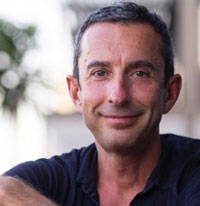 Dr Roberto D’Angelo
Dr Roberto D’Angelo
Suite 33, 8 Hill St,
Surry Hills NSW 2010 Australia
Email Robreto D’Angelo
![]()
Back to Top
News from Aotearoa New Zealand
By Jane Tuson
Kia Ora from Aotearoa New Zealand!
We hope all those who attended the conference in Sydney had a rich and rewarding time and that, hopefully, some of you made it even further south to New Zealand. Our local chapter has not had a particularly active year in terms of events due to some of our members being involved in assisting with the conference organization. Additionally some members of our small committee have experienced challenging life events that have meant that their focus has needed to be elsewhere. We recently had our annual general meeting, during which we decided to change our status from formal chapter to instead an interest group. The current committee felt that the concept of an interest group meant a less formal commitment to the running of a chapter and all that requires, and permits people to respond to organizing events when they feel they are well resourced.
On a political note, it is an election year here in New Zealand and we are noting with interest the increasing dialogue around the erosion of mental health services and our tragic suicide statistics. It is our sincere hope that these issues will be given the urgent attention they require by whomever forms the new government. Many of us from the relational psychotherapy community are participating in advocacy and are lobbying local politicians in attempt to keep this at the forefront of peoples’ minds.
Wishing everyone the very best from us here Down Under.
Nga mihi nui,
Jane Tuson on behalf of the IARPP New Zealand Interest Group
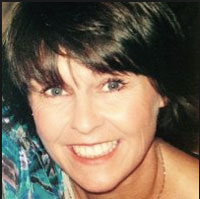 Jane Tuson
Jane Tuson
Email Jane Tuson

